Opendoor’s recent stock rally, driven by a surge in investor enthusiasm, masks a fundamentally unstable business model and an uncertain economic environment. The company, once dismissed as a fading player in the real estate tech sector, experienced a nearly fivefold increase in its share price since July. Such a meteoric rise, however, must be scrutinized comprehensively. Is this optimism rooted in genuine turnaround potential, or is it a classic case of momentum-driven speculation detached from reality?
The fact that the stock was trading at a mere 51 cents in June demonstrates how far market confidence can plummet during downturns. Yet, this same company has now attracted hordes of investors gambling on a future where revenue growth and profitability seem plausible again. This optimism seems prematurely optimistic at best, especially when considering the broader macroeconomic challenges and the company’s own recent financial struggles.
While Opendoor’s management has attempted to paint a picture of strategic repositioning—shifting focus from capital-intensive iBuying to a referral-based model—the evidence of a successful turnaround remains thin. Market conditions continue to favor sellers more than buyers, thanks to persistently high mortgage rates and declining demand. These challenges have cut into revenue, with the company experiencing a significant drop from $15.6 billion in 2022 to just over $5 billion last year. The recent revenue increase of only 4% in the second quarter signals sluggish growth at best, which fails to inspire confidence in a swift recovery.
Misleading Optimism and the Reality of Financial Fragility
The recent rally appears to be fueled more by speculative fervor and bold forecasts than by tangible improvements in business fundamentals. Hedge fund manager Eric Jackson’s optimistic projection that Opendoor’s stock could reach $82 underscores this disconnect. Jackson’s view hinges on the notion that a return to revenue growth and increased market share will eventually justify higher valuations. Yet, as of now, the company’s actual performance tells a different story.
The second quarter’s financials reveal a company still hemorrhaging cash, with a net loss of $29 million—a notable improvement from a $92 million loss a year earlier, but hardly a sign of sustainable profitability. Looking ahead, the projections for the current quarter are grim, with revenue expected to decline by more than a third compared to the previous year. The company’s plans to acquire fewer homes and cut marketing spend further illustrate how precarious its position remains. This conservative stance isn’t just a response to market conditions; it may also be a clear acknowledgment of the company’s limited ability to generate meaningful growth amidst economic headwinds.
Furthermore, the decision to pivot towards a less capital-intensive referral business shows some strategic foresight, but it could be too little, too late. Given the magnitude of the challenges—the declining housing market, rising borrowing costs, and shrinking demand—this shift may not be enough to restore confidence and stabilize financials.
Market Fascination vs. Underlying Reality
The recent enthusiasm around Opendoor reveals a broader phenomenon where markets often chase stories of turnaround, ignoring the underlying fragility of business models. The surge driven by individual investors and hedge fund endorsements is less about the company’s current health and more about speculative hopes. It reflects a cycle where hope is inflated beyond pragmatic expectations, leading to volatile swings that do little to create real value.
Opendoor’s management is clearly aware of the importance of visibility and perception, as Wheeler pointed out. However, providing a platform for storytelling does not substitute for solid financial fundamentals. The company’s repeated attempts to reinvent itself and highlight strategic shifts are laudable, but they don’t mask the gravity of current realities: a housing market under pressure, a shrinking customer base, and a business model heavily reliant on volume and market conditions beyond its control.
In a sense, Opendoor encapsulates the contradiction of modern tech-enabled real estate: promising innovation while grappling with fundamental economic forces that threaten to derail any semblance of stability. The company’s future depends less on hype and more on delivering consistent, profitable growth—something that, as of now, remains elusive. The current rally may fuel optimism temporarily, but it doesn’t address the deep-rooted structural issues that continue to loom large over its prospects.


Leave a Reply